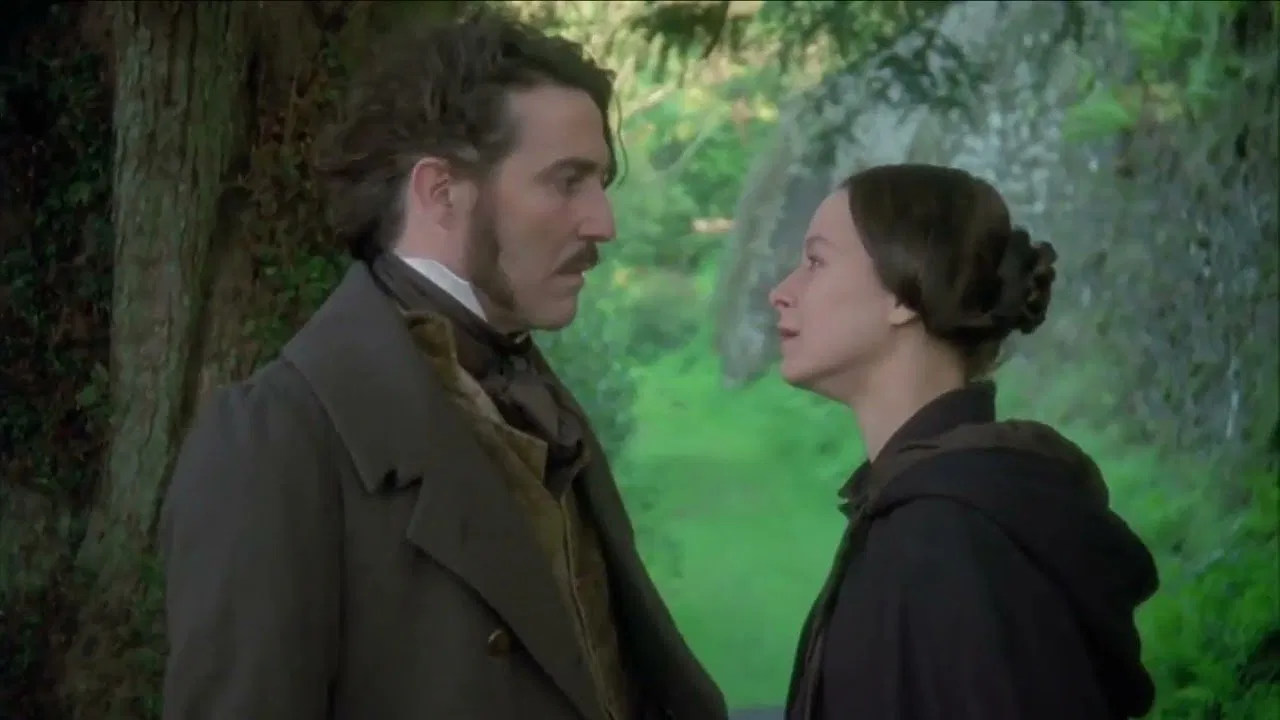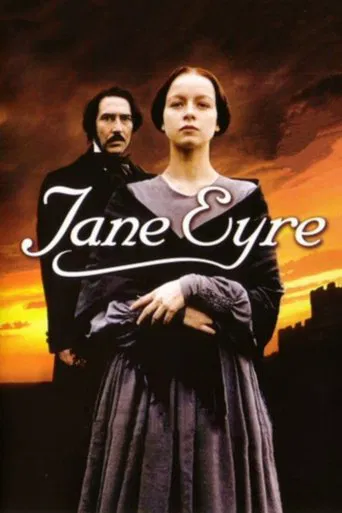


I disagree with the idea that this is a terrible version.Remember the actors do not always have the freedom to act as they wish. They are hired to act as the DIRECTOR tells them too. So the drama is presented not from the actors viewpoint but the directors'.but more specifically I wish to point out the turning point scene in the novel. specifically - the fire in Rochester's bedroom.The point on which the entire novel turns is when Rochester reaches out his hand to touch Jane. She demurs (in the book, AND this version). Rochester explains that even STRANGERS shake hands.Timidly, Jane takes his hand. That first touch is the magic that awakens Jane's passions. Rochester's attempt to express his feelings is rejected by Jane and she leaves and returns to her room. The next scene shows her in her bed, struggling over the knot in her stomach. She has never known love. Suddenly she realizes that she loves Rochester and he might even love her in return.But the next morning he has left the estate to visit 'some pretty girls'. She is devastated. She mistook that touch for love. She looks at herself in the mirror. She is plain, and poor. WHY would anyone as rich as Mr. Rochester ever love someone like her.This is the ONLY version (I've seen them all) that correctly captures that moment. Although the version with Charlotte Gainsboro captures the look in the mirror much better. Emelia Clarke is quite good, and also the most complete version, but I really like Gainsboro best for her face (closest to my vision of Jane) and Morton for her passion.
... View MoreI'll start by saying this was the first version I've ever seen, and after watching it, I decided to read the book (not the other way around).When I first watched it, I really had no idea what the story was about so I wasn't on my guard, and some scenes really stroke me in an emotional level I didn't believe it when I first started watching it. Samantha Morton as Jane was very convincing, not a beauty, not ugly, then I found out that was how Brontë described her in the book. Jane was well mannered, sweet and tender, but with iron will and fire in her soul, it was a perfect combination of a heroin in the book who had to endure a lot of things during her life.As for Mr. Rochester, well I'm a big CIaran Hinds so I may not be completely objective in reviewing his acting, but for me, he was PERFECT. Yes he yelled, he was too proud, sarcastic, but his raw passion and angst was right there you feel it, and specially in the parts where he seemed to touch heaven, and the other part where hell was right before him (those who read the book or watched the movie will know what parts those are).The chemistry between Morton and Hinds is amazing, when they are talking under the tree, I really began to cry and felt overwhelmed by the intense emotion flooding my screen, and then in the same tree after the "event", I cried some more because I could feel the despair from Rochester and Jane's sorrow but determination. And finally, in the end, I cried more and more with the strong performance from the two of them.I read the book afterwards, and yes many scenes are left out (gipsy, Jane's aunt dying, Jane's dreams, the tale of Bertha Mason, Jane's new found fortune, etc...) but considering they had only 1 hour 40 minutes to consolidate an 800 pages book, I believed they did a pretty good job.I read some comments about people who disliked Hinds performance as Rochester, saying he screams too much, well personally I didn't think he "screamed", he raised his voice and Rochester does that a lot in the book. I watched another version with Michael Fassbender, and it lacked the passion this Rochester has, it actually made me yawn.I highly recommend this version, the casting is great, overall the movie is very true to the book, and the strong performances given by Morton as Jane, and Hinds as Rochester, is really something not to be missed. If you imagined Mr. Rochester as a handsome, well mannered, with integrity, soft spoken and tender man (in other words, a Jane Austen hero, I can't imagine why somebody would imagine him like that), you will hate Hind's Rochester, but if you imagined as a non-attractive man in a conventional way, sarcastic, snappish, moody, witty, intense, rough, tough, passionate, angry but tender when he must and overall, a tortured soul who finds redemption through pure love, you will not be disappointed with him.
... View MoreI love watching films that exist in many incarnations, because often you can get more out of every version. There's a sort of circumlocution of the narrative that you can achieve with multiple versions. That's true even if the film itself is horrible. This one is. Its bad because the book depends on accretive structure. Its all about symmetries. Jane's character and all her desires are shaped by what we see early on, so we can understand the love we encounter toward the end. If you toss out all that structure, essentially you make Jane inhuman. You might get the message somehow that the love is intense, but you will not experience it, internalize it.Its also wrong because of all the shouting. Everyone shouts, including the housekeeper! This is not the character of the times, nor the language, which is distinctly modern. I wonder what they were thinking, that there was a tradeoff of charm for understanding or familiarity?It seems that most commentors focus on the nature of Rochester, how he played, whether as a broken man who is a pushy bully, or whether as a haunted, quiet basket case. If you're on Bronte's side, you'll prefer the more complex basket case. What works is that their breaks compliment and heal.My own focus (and that of the author, for what it is worth) is on Jane. Watching many depictions of Jane is something of a thrill. Often the actress who is cast has as her chief attribute something that the filmmaker considers as an open innocence.Jane came from a small world of books only. She created herself in spite of what she saw, excepting the essential Miss Temple. (Miss Temple's abandonment of Jane for marriage is key to the story.) Rochester has all of the opposite: extremely worldly but with no sense of self, no tools to invent himself. Jane is all story and Rochester is all lack of story, his story.Anyway, this Jane is Samantha Morton. She does have an amazing demeanor. Her face really does project much of what we imagine Jane is. Firm, settled, strong, simple, and toward the end absolutely committed. We know from that face the whole story: the immense availability of character, the deep, deep heart (oh why cut the Helen Burns part?), the uncomplicated life template.Other actresses have done well with this too. But there's something about seeing a body so gaunt and sexless, but so yearning.It helps to know that Woody Allen cast her in a similar role, written for her in what I think is his most perfect movie. Following that Spielberg cast her in the pivotal role in his P K Dick/ Agatha Christie mystery. And following that, the experimental Winterbottom cast her in again a role that had Jane at the core. And all of that adds her Mary Queen of Scots in which you can still see our Jane.It also helps to know that if you've followed this Jane, you've seen her nude several times and you've watched her body fill out to normal human size. So you'll know the physical repression she had at the time, 19 years old.Ted's Evaluation -- 2 of 3: Has some interesting elements.
... View MoreI think that Samantha Morton's Jane Eyre in Robert Young's 1997 TV adaptation of the great novel, could've been the best screen Jane ever. Morton was 20 years old and the closest in age to the young orphaned governess, childlike in the appearance but strong willed, serene yet very intelligent with acute sense of right or wrong. Two years prior to her Oscar nominated role as a mute girl in Woody Allen's "Sweet and Lowdown", Morton proved that she could say a lot by the mere look at her face, by her impressive and speaking eyes alone. It is sad that the film took too many liberties with the book and not only in omitting many important plot lines in order to fit in its 108 minutes length, but with too many changes to the very nature of the novel's two main characters and their relationship. Jane in the scenes with her employer is sometimes too demanding and not as tactful as she is in the book. The changes are especially obvious in Mr. Edward Rochester as he was played by Ciaran Hinds. Hinds is a talented, intense actor but I can't agree or like his reading and interpreting of Mr. Rochester's character. Some his scenes in the film made me cringe. Mr. Edward Rochester of the novel was not yelling or rather barking brute - it was difficult for me to believe that Jane Eyre would come to love so much. I also was unpleasantly surprised with Mr. Rochester openly displaying his affection for Adele. This manifestation was against the logic of his character.
... View More